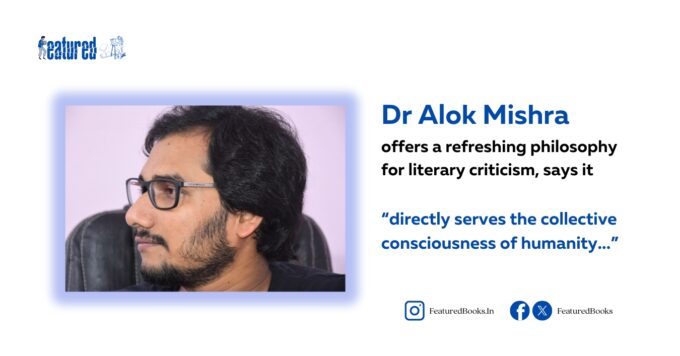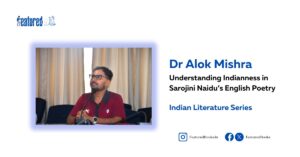Poetry, Solitude, and Criticism: The Vision of Dr Alok Mishra
Poetry has often been regarded as the supreme art form through which human beings articulate their deepest thoughts, emotions, and insights into the nature of existence. It is a form that thrives on individual vision but communicates to the collective. It relies on silence as much as it depends on words, and it draws its nourishment from solitude even as it is meant for society at large. In this light, Dr Alok Mishra’s reflections on poetry, solitude, and criticism present a thoughtful map for understanding the craft of poetry and the role of criticism in sustaining its vitality. His ideas highlight how solitude cultivates rhythm, how criticism demands nobility and objectivity, and how the poetic imagination engages with timeless truths.
At the very outset, Dr Mishra offers a profound statement: “Poetry is the rhythm composed in solitude and distributed to the masses.” This single line encapsulates a dual truth about poetry. On the one hand, poetry is born in the most private moments when a poet interacts with the self, with silence, and with the unfathomable currents of thought and feeling that rise within. On the other hand, poetry refuses to remain confined to this inwardness. Once written, it seeks an audience, travelling into the minds of others and resonating across time. The solitary act of composition thus turns into a social phenomenon. Poetry demonstrates how something that originates in solitude can nourish and sustain the collective imagination of humankind.
Yet, solitude is not merely emptiness or withdrawal. Dr Mishra clarifies this further in his characteristic style:
“No, no gods or wild beasts live in solitude! Only those who solve the mystery of what lurks behind the skins we wear enjoy the bliss of solitude and sing the divine lyrics with nature acting as the chorus.”
~ Dr Alok Mishra
Well, we can always leave the parody or the whimsical mimicry behind. No hard feelings for Aristotle! On a serious note, this insight distinguishes solitude from the misconceptions often associated with it. Solitude is not an escape into the wilderness of mindless isolation. It is a conscious search for truth. It involves penetrating the masks, the layers, and the superficialities of human life. When a poet engages in this pursuit, solitude becomes blissful. It becomes a partnership with nature, where the poet sings and nature responds with its chorus. This poetic solitude is creative, not destructive.
In the history of poetry, this relationship between solitude and creation has been repeatedly acknowledged. From the meditative verses of the Upanishadic seers to Wordsworth’s reflections in the Lake District, from the ascetic imagery in T. S. Eliot to the visionary cadences of Sri Aurobindo, solitude has been the source of poetic power. Dr Mishra’s words resonate with this lineage while emphasising that solitude is not otherworldly. It belongs to those who dare to solve the mystery of existence, who are willing to uncover the truth beneath human façades. Poetry, then, is not a decorative pursuit but an attempt to sing divine lyrics in the company of the universe itself.
However, for poetry to sustain its value in society, there must also exist a critical apparatus that does justice to its depth. This is where Dr Mishra turns to the subject of criticism. His observations on the state of criticism in our times are pointed and necessary.
“Criticism is a noble job that should be pursued with due diligence by the scholars who are keen to lay bare the threads of design and scheme of a work, not to degenerate it but to bring forth an elevated experience for readers who might have missed these while looking to extract delight from the work of literature.”
~ Dr Alok Mishra
Here, criticism is not reduced to the sterile dissection of a text. It is instead elevated to an act of service. A true critic helps uncover design, structure, scheme, and subtlety that a casual reader may miss. The critic’s responsibility is to enhance experience, to deepen appreciation, and to cultivate a readership that can connect with the aesthetic and philosophical richness of a text. The nobility of criticism lies in its refusal to denigrate. It is not meant to tear down literature but to uplift it.
Unfortunately, academic criticism does not always live up to this calling. Dr Mishra observes with candour: “Academic criticism often focuses on pleasing the examiners for various purposes. It lacks the aesthetic design, the nobility of purpose and the freedom to touch emotional and humane aspects of the literary work that appeal to the senses rather than the intellectual faculty.” The insight here is crucial. In many academic contexts, criticism becomes a performance for the sake of grades, degrees, or recognition. It becomes subservient to the fashions of intellectual discourse. What gets neglected is the soul of literature itself. When criticism becomes mechanical, it loses the capacity to engage with the emotions and humane aspects of texts that are central to their existence.
Dr Mishra is careful, however, not to dismiss the intellectual impulse altogether. He notes:
“I do not discount the intellectual urge in criticism. However, I have always maintained that academic contours do not provide the necessary freedom for students, and even professors, to pursue criticism comprehensively. The political boundaries bind it – what is in fashion has to be chased instead of creating new pillars that might provide readers at large with new possibilities to look upon literary works.”
~ Dr Alok Mishra
The concern expressed here is not with intellect itself but with the boundaries imposed by institutional frameworks. Academic criticism often becomes a pursuit of relevance within what is fashionable, rather than an exploration of what might be genuinely meaningful. In this model, the critic loses the freedom to be exploratory, courageous, and creative.
What, then, should be the true nature of criticism? Dr Mishra offers a compelling vision:
“Literary criticism, to be precise, and when pursued beyond the boundaries of academic jargon, directly serves the collective consciousness of humanity! It should be carried out to encourage mass participation in the perusal of serious literature or to find seriousness even in the most playfully written literary works. Extending the hypothesis, every author has a thread or two hidden to conceal the life lessons that are layered beneath the entertaining episodes in the storyline. Readers, at large, given their busy and callous lifestyle bereaved of the aesthetic values, may conveniently ignore toiling to reveal those layers; it is, therefore, incumbent upon literary critics to make it happen!”
~ Dr Alok Mishra
This vision is refreshing and necessary. Literary criticism, when liberated from narrow academic boundaries, becomes an act of service to humanity’s collective consciousness. It not only engages with texts but also encourages participation from readers who might otherwise remain disengaged. Criticism thus becomes democratic. It acknowledges that even in playful or entertaining works, threads of life lessons lie concealed yet accessible. The critic’s responsibility is to bring them to light, to ensure that the lessons are not lost amidst the noise of daily life.
Dr Mishra’s perspective also resonates with long traditions of literary thought. In classical Sanskrit poetics, for example, the critic was not merely a scholar but a sahridaya—someone with a heart attuned to beauty, capable of guiding others into aesthetic experience. Similarly, Aristotle, in his Poetics, imagined criticism as a means of explaining how tragedy could lead to catharsis, thus offering insights into the universal dimensions of literature. Dr Mishra’s insistence on criticism as service to collective consciousness echoes these traditions while addressing the contemporary need to move beyond jargon and institutional conformity.
When we put together his reflections on poetry, solitude, and criticism, a coherent philosophy begins to emerge. Poetry arises from solitude but is shared with the masses. Solitude is blissful when it becomes a quest for truth beneath appearances, not an escape into fantasy. Criticism, meanwhile, is noble when it deepens appreciation and serves humanity’s collective consciousness. Academic criticism may limit itself to intellectual fashions. Still, genuine criticism dares to reveal life lessons hidden in texts. Both poetry and criticism thus become complementary forces. One creates rhythms born of solitude, the other interprets those rhythms for the collective good.
What makes Dr Mishra’s vision particularly valuable is its refusal to succumb to cynicism. While he is aware of the limitations of academic criticism and the dangers of misunderstanding solitude, he continues to insist on its transformative potential. Poetry can be universal, solitude can be blissful, and criticism can be noble. Each requires discipline, courage, and conviction. Each requires freedom from superficiality.
In conclusion, Dr Mishra’s reflections remind us that literature is not merely entertainment. It is a force that arises from solitude, speaks to the masses, and demands criticism that is noble and liberating. “Poetry is the rhythm composed in solitude and distributed to the masses.” This rhythm continues to sustain civilisation, offering both aesthetic pleasure and wisdom. When critics pursue their task with sincerity, they uncover threads of life lessons that might otherwise be ignored. In this way, poetry and criticism together serve humanity’s collective consciousness. They preserve literature’s place not only in history but in the ongoing drama of human existence.
..
..
Article by Amit for Featured Books
(Extracts used here are taken from Dr Alok Mishra’s latest blog post on his official website – Dr Alok Mishra)
Dr Alok is the founder of English Literature Education, a noted poet and distinguished literary critic known for his opinions on Indian English literature, literature in general, poetry and criticism.
..
Thanks for reading!




